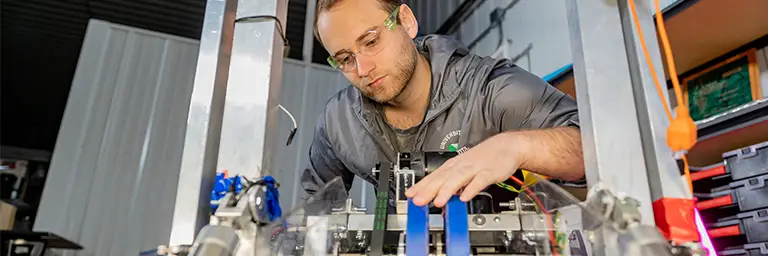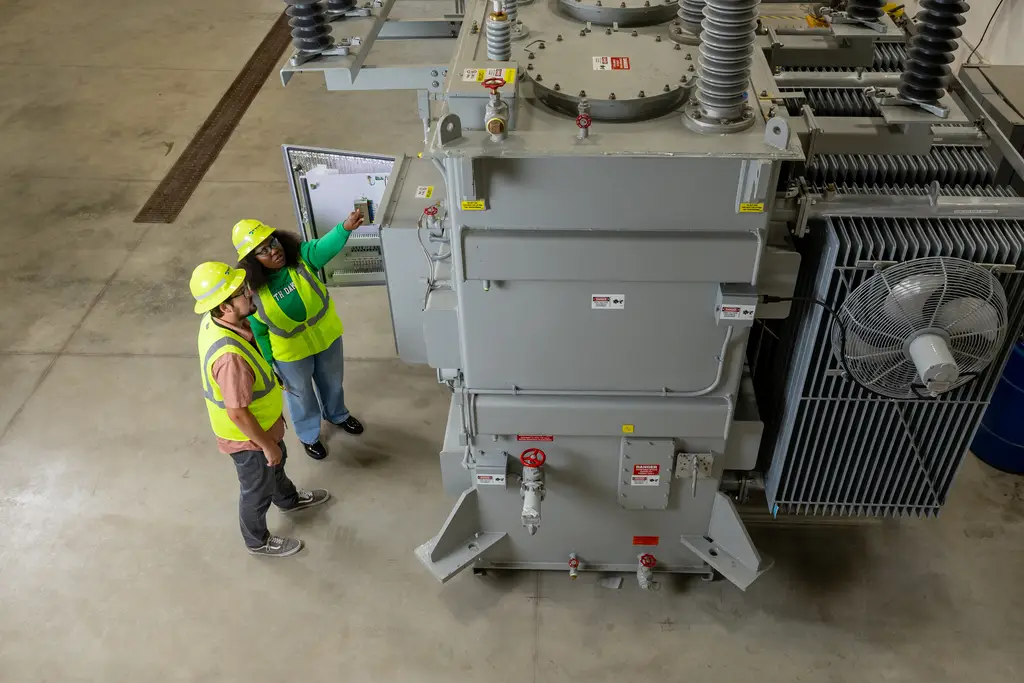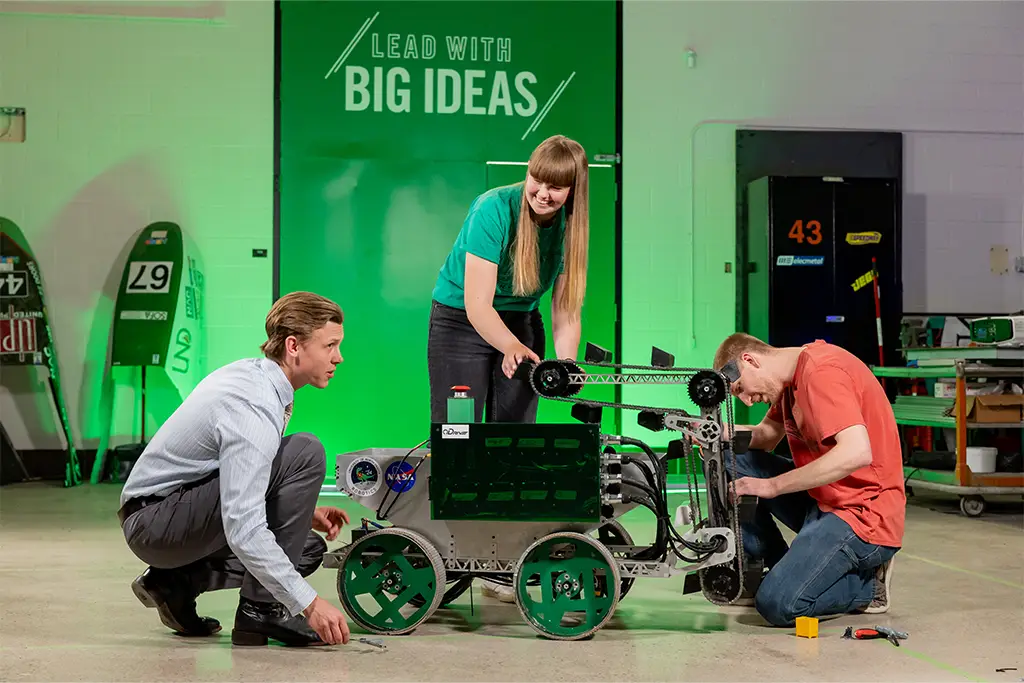
How to Become an Engineer: Education, Skills and Career
Have you ever crossed a bridge, used a smartphone app, or seen a machine work and thought, “How did someone build this?”
That someone was likely an engineer.
Engineers design so many things we rely on daily, from safe roads to clean water systems and even life-saving medical tools. They work across industries, including technology, healthcare, construction, and energy.
If you’re curious, creative, and enjoy solving problems, learning how to become an engineer could lead to a meaningful and exciting career. Let’s explore what it takes to become one.
Key Takeaways
- Engineering is a highly prospective field, with around 195,000 jobs expected to become available every year until 2033.
- Choosing the right accredited engineering degree and gaining practical experience are essential first steps for becoming an engineer.
- Engineering offers diverse opportunities to solve real-world problems and make a meaningful impact across many industries, including civil engineering, aerospace engineering, and software engineering.
What Is the Role of an Engineer?
Engineering is both technical and creative. Engineers use facts, data, and formulas, but they also rely on imagination to come up with new ideas.
Think of Isambard Kingdom Brunel, who used bold thinking and precise planning to build railways and tunnels across England. Or Katherine Johnson, a brilliant mathematician and aerospace engineer whose calculations helped NASA send astronauts to the moon. Her work showed how engineering can be both deeply scientific and deeply inspiring.

At its core, an engineer’s job is to solve problems and improve how things work. They turn ideas into real, working systems that help people in everyday life. From smartphones to clean water systems, engineers are behind much of the progress we see today.
Here are some key responsibilities engineers take on:
- Identifying problems and figuring out practical solutions
- Designing products, structures, or systems that work safely and efficiently
- Testing materials and prototypes to make sure they perform well
- Improving existing tools or processes to save time and resources
- Working with teams to plan and complete complex projects
Engineers work across many fields, including:
- Civil engineering for roads, bridges, water systems, and buildings
- Mechanical engineering for machines, manufacturing, and power systems
- Software engineering for apps and websites
- Biomedical engineering for medical tools and devices
How to Become an Engineer
Becoming an engineer takes time, effort, and a strong interest in solving problems. Engineering requires studying courses that use a lot of math and science along with learning technical skills.
Depending on where you live and the kind of engineering you select, the steps may differ slightly. Software engineers, for instance, might take a different route than mechanical or civil engineers.
For those who enjoy coming up with practical solutions and making the world a better place, the journey is rewarding regardless of the field. Let’s walk through the typical steps involved.
Choose the Right Engineering Degree

Choosing the right engineering degree is an important first step. Engineering has many branches, so it’s helpful to explore fields like civil, mechanical, electrical, software, or chemical engineering to see which one fits your interests and plans.
Once you’ve narrowed it down, look for a bachelor’s degree program that is ABET-accredited. ABET ensures the program meets high-quality standards recognized by employers and licensing boards. Accreditation is key if you plan to become a licensed engineer later.
University of North Dakota (UND) offers several strong engineering programs, including:
- BS in Aerospace Engineering
- BS in Biomedical Engineering
- BS in Chemical Engineering
- BS in Civil Engineering
UND also offers M.S. and Ph.D. programs in respective fields. Taking time to choose the right program will help you stay motivated and build a strong foundation for your career.
Complete Internships
Internships give you the chance to apply what you learn in class to real projects. They help you build confidence, sharpen your technical skills, and see how engineers work in the real world. Many employers look for internship experience when hiring entry-level engineers, so it can make your resume stand out.
You can also join cooperative education (co-op) programs, where you earn credit while working at a company. These programs are often longer than internships but offer deeper experience.

At UND, students can find internships through career fairs, the Career Services Center, or by connecting with faculty who have industry contacts.
Internships often lead to job offers, especially if you show a strong work ethic and problem-solving skills. They also help you discover what kind of engineering you enjoy most.
Take the Fundamentals of Engineering exam
The Fundamentals of Engineering (FE) exam is the first step toward becoming a licensed professional engineer. This exam is usually taken during the final year of college or soon after graduation.
You can register for the FE exam through the National Council of Examiners for Engineering and Surveying (NCEES). The test covers topics from your degree program, including math, science, and engineering principles.
After passing the exam, you’ll earn the title Engineer-in-Training (EIT) or Engineering Intern (EI). This shows that you’ve mastered the basics and are on the path toward becoming fully licensed. It also looks great on a resume, even if you’re not sure yet about pursuing a license.
Obtain a Professional Engineering License
To become a licensed Professional Engineer (PE), you need about four years of work experience under the supervision of a licensed PE. This experience gives you a deeper understanding of engineering practices and helps you build trust with future employers or clients.
After gaining enough experience, you’ll be eligible to take the Principles and Practice of Engineering (PE) exam, which is also offered through the NCEES. The exam focuses on your specific engineering discipline and tests your ability to apply knowledge to real projects.
A PE license is often required for roles that involve signing off on public projects, leading teams, or offering services directly to the public. In some industries, it can also lead to better job opportunities and higher pay.
Continue Education and Specialize

After earning your bachelor’s degree and gaining some experience, you may want to focus on a specialized area within engineering. A master’s or Ph.D. can help you reach that next level. Specializing allows you to work on more advanced projects, qualify for teaching or research roles, and increase your earning potential.
At UND, you can explore the following master’s and Ph.D programs:
- M.S. in Biomedical Engineering
- Biomedical Engineering Ph.D.
- Chemical Engineering Ph.D.
- Master’s in Chemical Engineering
- Master’s in Civil Engineering
- Ph.D. in Civil Engineering
Popular areas for further study include aerospace engineering, environmental engineering, biomedical engineering, and engineering management. You can also earn certifications in systems engineering, project management (PMP), or cybersecurity to boost your qualifications.
Advance Your Career
As you gain experience, you may want to move into leadership positions like project manager, team lead, or engineering director. These roles often involve planning budgets, guiding teams, and making key decisions about projects.

To grow professionally, it helps to network with others in the field. You can do this by joining groups like the Institute of Electrical and Electronics Engineers (IEEE), the American Society of Mechanical Engineers (ASME), or the National Society of Professional Engineers (NSPE). These organizations offer events, training, and job boards.
It’s also important to stay current with new technologies, software tools, and industry trends. You can take short courses, attend webinars, or read engineering journals to keep your skills fresh.
Career growth in engineering doesn’t happen overnight, but by staying active, curious, and connected, you can keep moving forward and open new doors.
Key Engineer Skills and Attributes
To succeed as an engineer, you need more than a strong grasp of math and science. Great engineers also bring a mix of technical ability, soft skills, and the right mindset. Here are some of the most important skills and attributes that help engineers thrive in their careers:
- Problem-solving: Engineers face challenges every day. Whether it’s fixing a design flaw or creating a new product, they must think through complex issues to find practical solutions.
- Analytical thinking: Breaking down information, spotting patterns, and making data-driven decisions are essential for solving engineering problems efficiently.
- Technical proficiency: A solid understanding of tools, software, and engineering principles helps bring ideas to life, from drafting blueprints to running simulations.
- Communication: Engineers must clearly explain their ideas to teammates, clients, and non-technical stakeholders through reports, presentations, and meetings.
- Creativity: Finding new ways to improve systems or design something completely new often starts with creative thinking.
- Teamwork: Engineering projects usually involve many people. Good engineers know how to collaborate and support others.
- Attention to detail: Small mistakes can lead to big problems. Being precise and careful is vital in this field.
- Adaptability: Engineering tools and methods are always evolving. Engineers must be open to learning and adjusting to change.
Is Engineering the Right Career for You?
Choosing a career is a big decision, and it helps to ask yourself a few honest questions. Do you enjoy solving complex problems? Are you curious about how things work? Do you like working with numbers, systems, or machines? If you answered yes, engineering might be a great fit.
Moreover, you should consider engineering if:
- You like building, designing, or improving things
- You enjoy math and science
- You think logically and use critical thinking skills
- You’re curious and ask “why” or “how” often
- You work well in teams and enjoy collaborating with others
- You like to learn new things and take on challenging projects
People who thrive in engineering are often persistent, detail-oriented, and open to learning. They enjoy both thinking and doing.
Some of the benefits of a career in engineering include high earning potential, job stability, and the chance to work on meaningful projects that help others. You can work in many industries, from tech and healthcare to energy.
On the downside, engineering can be demanding. Some roles involve long hours, tight deadlines, and a need for constant learning. But for those who enjoy problem-solving and making a real-world impact, it can be incredibly rewarding.
Conclusion
Engineering offers a path where curiosity and hard work come together to create meaningful change. Starting with choosing the right degree, gaining practical experience through internships, and passing important exams, each step builds your knowledge and prepares you for a successful career. Continuing education and specialization open even more doors along the way.
Engineers are the creative force behind building the world we live in, from creating safer bridges to developing life-saving medical devices. This career offers variety, growth, and the chance to solve real problems that affect many people.
If you feel inspired to become an engineer, the University of North Dakota provides excellent accredited programs and support to help you reach your goals. Taking this first step can set you on a rewarding journey toward a career that makes a difference.
FAQs
It takes about four years to earn a bachelor’s degree to become an engineer.
It depends on the economy and job market, but Civil & Mechanical Engineering are often considered to have a broad array of industries and job opportunities across the country.
Petroleum, computer hardware, and aerospace engineering are among the highest-paying engineering careers.